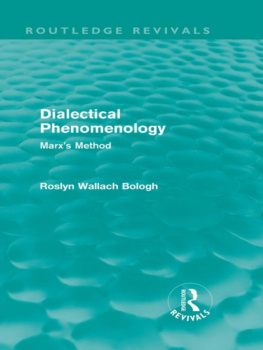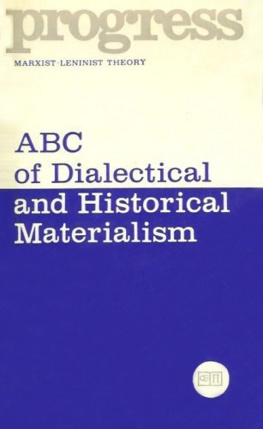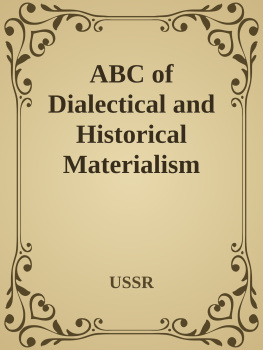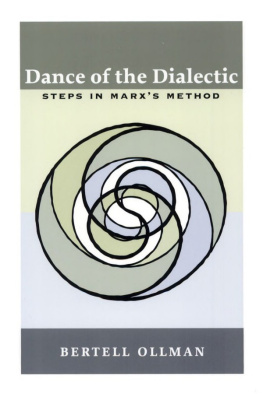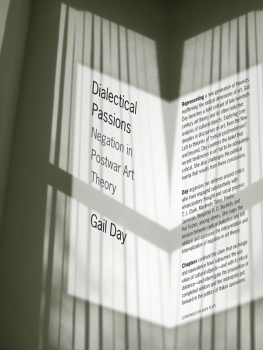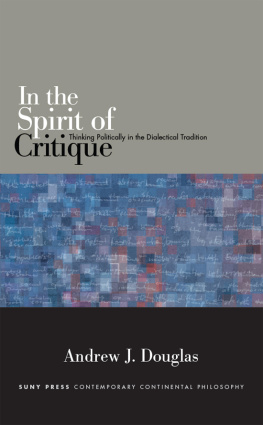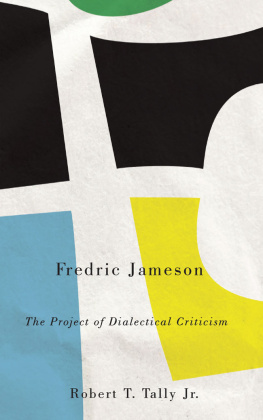In this inquiry into Marxs method of theorising, originally published in 1979, Roslyn Bologh analyses theory in the same way that Marx analyses the production of capital, and provides a set of rules for reproducing Marxs method. The rules are developed through an examination of the Grundrisse, a text by Marx that combines his technical critique of political economy with his humanistic, philosophical concerns and his historical perspective. Dr Bologh concludes that Marxs method, as dialectical phenomenology, offers a way of analysing language, knowledge and the social relations and practices of everyday life, as well as the more obvious phenomena of capitalism.
Dialectical Phenomenology
Marxs Method
Roslyn Wallach Bologh

First published in 1979
by Routledge & Kegan Paul Ltd
This edition first published in 2010 by Routledge
2 Park Square, Milton Park, Abingdon, Oxon, OX14 4RN
Simultaneously published in the USA and Canada
by Routledge
270 Madison Avenue, New York, NY 10016
Routledge is an imprint of the Taylor G Francis Group an informa business
This edition published in the Taylor & Francis e-Library, 2009.
To purchase your own copy of this or any of Taylor & Francis or Routledges collection of thousands of eBooks please go to www.eBookstore.tandf.co.uk.
1979 Roslyn Wallach Bologh
All rights reserved. No part of this book may be reprinted or reproduced or utilised in any form or by any electronic, mechanical, or other means, now known or hereafter invented, including photocopying and recording, or in any information storage or retrieval system, without permission in writing from the publishers.
Publishers Note
The publisher has gone to great lengths to ensure the quality of this reprint but points out that some imperfections in the original copies may be apparent.
Disclaimer
The publisher has made every effort to trace copyright holders and welcomes correspondence from those they have been unable to contact.
ISBN 0-203-85827-1 Master e-book ISBN
ISBN 13:978-0-415-56811-1 (hbk)
ISBN 13:978-0-203-85827-1 (ebk)
ISBN 10:0-411-16811-0 (hbk)
ISBN 10:0-203-81827-1 (ebk)
Dialectical Phenomenology
The International Library of Phenomenology and Moral Sciences
Editor: John ONeill,York University, Toronto
The Library will publish original and translated works guided by an analytical interest in the foundations of human culture and the moral sciences. It is intended to foster phenomenological, hermeneutical and ethnomethodological studies in the social sciences, art and literature.
ROSLYN WALLACH BOLOGH
Department of Sociology St Johns University, New York
Dialectical phenomenology
Marxs method
Routledge & Kegan Paul
Boston, London and Henley
This edition published in the Taylor & Francis e-Library, 2009.
To purchase your own copy of this or any of Taylor & Francis or Routledges collection of thousands of eBooks please go to www.eBookstore.tandf.co.uk.
First published in 1979
by Routledge & Kegan Paul Ltd
39 Store Street, London WC1E 7DD,
Broadway House, Newtown Road,
Henley-on-Thames, Oxon RG9 1EN and
9 Park Street, Boston, Mass. 02108, USA
Copyright Roslyn Wallach Bologh 1979
No part of this book may be reproduced in any form without permission from the publisher, except for the quotation of brief passages in criticism
ISBN 0-203-85827-1 Master e-book ISBN
ISBN 0 7100 0335 8 (Print Edition)
For Dan, Howie and Gary
PREFACE
In the work that follows, I analyze Marxs theorizing. I do so by concentrating on his method. I formulate this method as dialectical phenomenology. The body of this book spells out this method and illustrates it with a reading of the Grundrisse: Foundations ofthe Critique of Political Economy,
Since its translation into English the value of the Grundrisse for understanding Marxs theorizing has become more widely recognized. In 1971 McLellan translated a volume of selected excerpts and in 1973 Nicolaus translated the whole text. The Grundrisse is particularly important as it combines the humanistic, philosophical concerns found in Marxs early writings with the technical analysis found in Capital.
The following work differs from previous treatments of Marx in several ways. It conceives of Marxs method as a form of anti-positivism. By anti-positivism, I refer to a perspective that consists of questioning taken-for-granted prevailing conceptions of reality, objective knowledge or science. It inquires into how any given knowledge or reality is possibleits grounds or historical presuppositions.
The aim of this work is to show the possibility of theorizing that is conscious of historical grounds or presuppositions as opposed to the unself-conscious mode that has characterized the main tradition of sociology. As Rossides (1978, p. 531) concludes in his analysis of the history and nature of sociological theorizing, The only choice open to social scientists is between being historical consciously (or problem-oriented) and being unconsciously historical (ideological).
Although others have read Marx as a critical and anti-positivistic theorist, they tend to interpret key aspects of his work positivistically. As against these inconsistent readings of Marx (which I discuss in the concluding chapter), this book presents an interpretation of Marxs work as exemplifying a consistently and completely anti-positivistic approach. I argue for this interpretation by analyzing Marxs method of theorizing. The interested reader might begin with the concluding chapter which highlights the similarities and differences between these other phenomenological readings of Marx and my own.
The method of theorizing that I attribute to Marx overcomes the dichotomy between a phenomenological sociology associated exclusively with the micro-level of social life (individuals and their subjective mental states and their face-to-face interaction) and a structural sociology associated with the macro-level (political and economic systems). It combines an analysis of language with an analysis of social life. It does so by suspending a mathematical version of language as composed of static elements, treating language instead as a form of life, a way of (re)producing a social world. Thus it adds the dimension of language but shifts from a notion of language as separate from life to a conception of language as a form of life itself.
Phenomenology has been criticized for reducing the study of social life to a study of the individual. The alternative has been entirely structural, begging the issue that phenomenology raises, the issue of consciousness. The conception of dialectical phenomenology as presented and explained in these pages deals with this issue in a radical way. It treats consciousness not as originating with the individual and mediating the individuals relation to society, nor as an epiphenomenon of external social forces. Rather, it deals with the issue of reductionism by treating consciousness as an ongoing social (historical) accomplishment.

